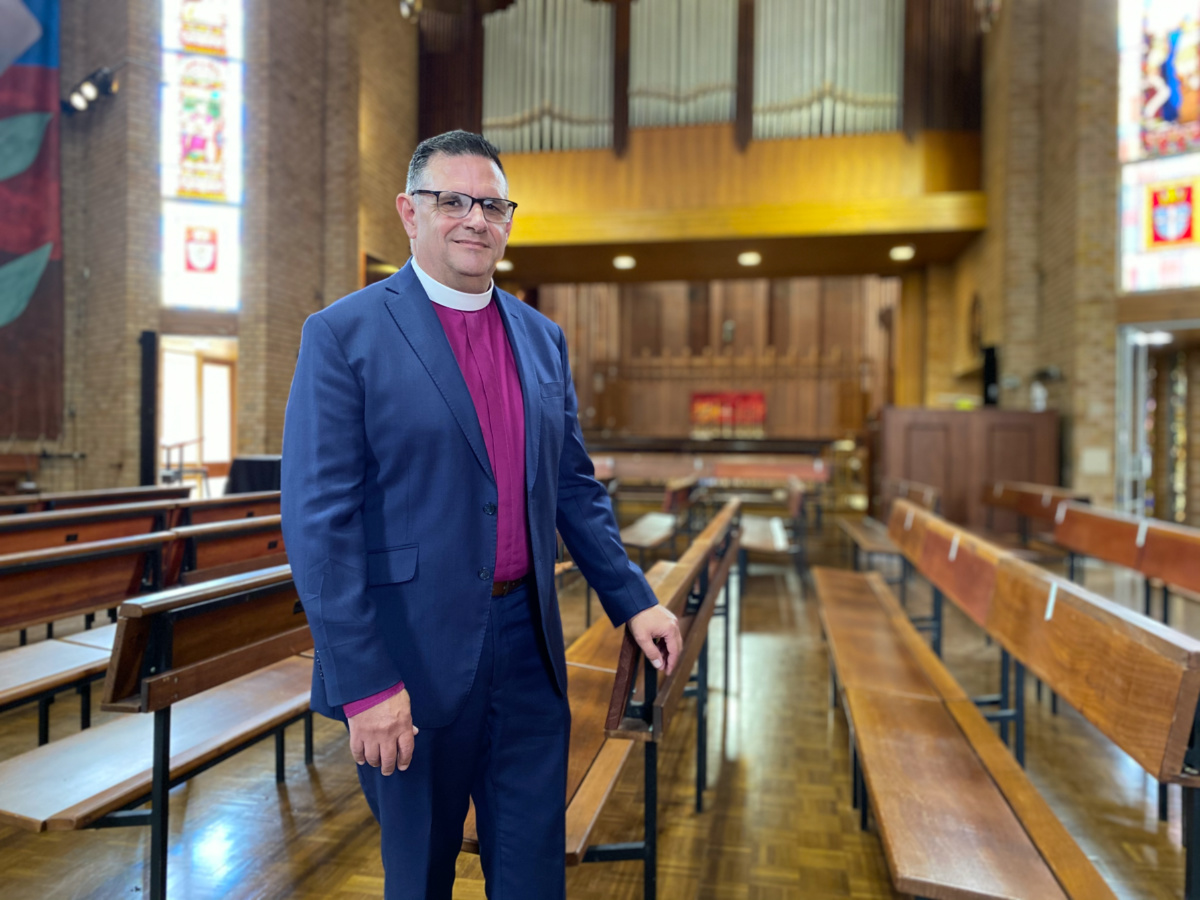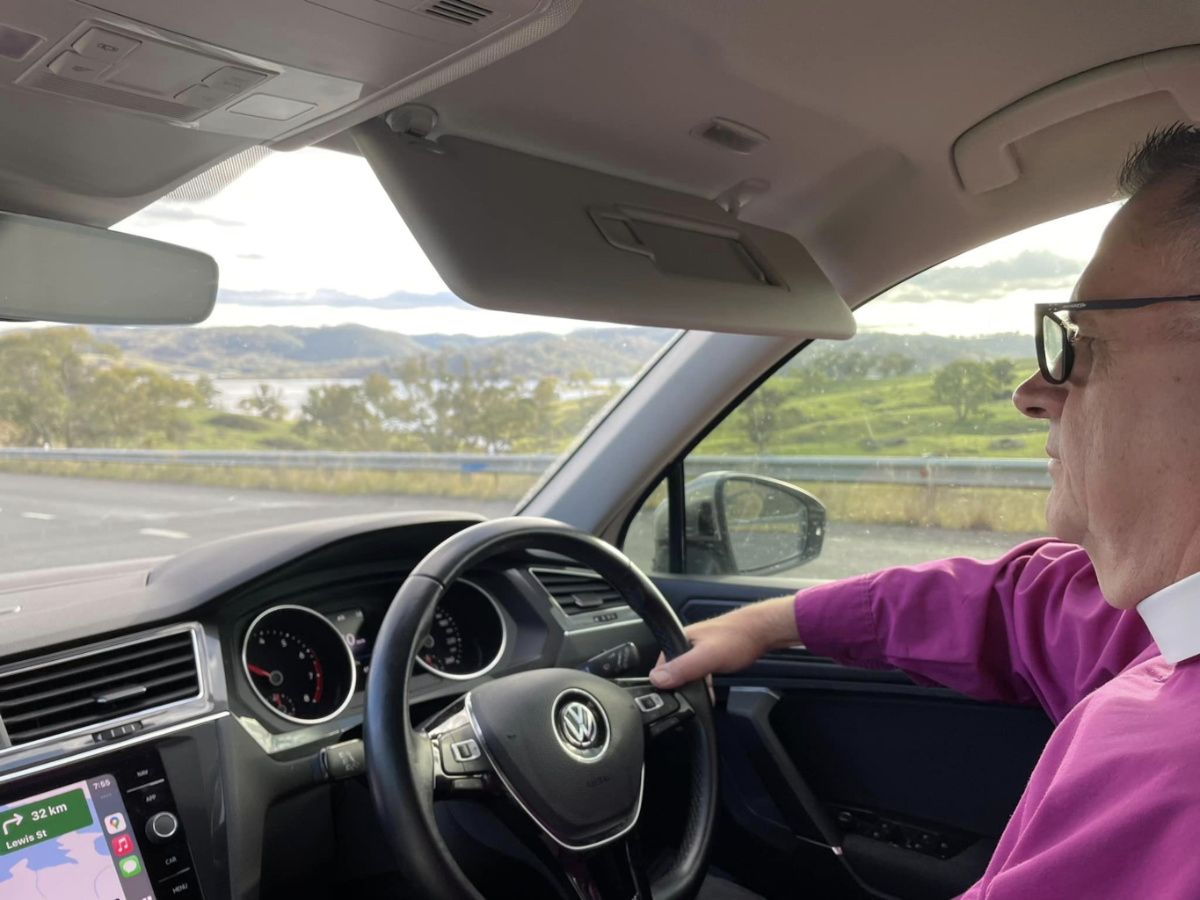
In a new column that explores a range of issues in conversation with Christian leaders, JO KADLECEK speaks with Mark Calder, Anglican Bishop of Bathurst in the Australian state of New South Wales…
Sydney, Australia
Anglican Bishop Mark Calder has long enjoyed driving. Whether it’s travelling to a conference or visiting a parish, he’d much rather make it a road trip than arrive via airplane. So when he was invited to lead the Diocese of Bathurst, the amount of travel it would require didn’t bother him. He started his role three and half years ago with a new car and has since clocked 135,000 kilometres. Just since January of this year, he’s done 15,000 kilometres for church-related trips, each one giving him more of vision for leadership and for the issues the people across the rural diocese face. Sight caught up with him when he was actually in his office for our inaugural Q&A…

Mark Calder, Anglican Bishop of Bathhurst in the Australian state of New South Wales. PICTURE: Supplied.
Tell us a bit about the stops along the way to becoming the Bishop of Bathurst.
“When I saw the careers advisor in high school, I raised the possibility of ministry and they thought it was a joke. I didn’t want to do university after school at that point, so I worked for a video production company. And a number of little incidents happened that led me to believe God had his hand on my shoulders to consider ministry. One was when some mates and I went camping in Noosa and visited the Baptist church there. I shared something from scripture during the open sharing time and an elder came up to me later, telling me he and his wife were taken with what I shared and would be praying that I’d train for ministry. I was a thousand kilometres from home [Sydney] so it was a surprise. Not long after that my non-Christian boss at the video company asked me what I wanted to do with my life. He helped me think through what was important and what mattered. I drove home after that conversation knowing exactly what I was going to do: I rang Moore Theological College the next day for an application form.
“Each parish where I’ve served since has been preparation for the next step. My experience [in North Sydney] at one parish helped me better understand a more traditional Anglican worship, which was appropriate for when I first started as a senior minister in Roseville. After about 17 years there, I knew I needed to do something else but didn’t want just another Sydney parish to do much the same thing. I wanted to explore ministry in other dioceses which is how I ended up in Noosa, a different context for ministry. All I learnt [in the Brisbane Anglo-Catholic diocese] helped me understand and appreciate that form of worship, preparing me for my present role. In 2019, I was away on retreat and got a call asking if I was willing to have my name go forward as a candidate for the bishop role. I entered into a discernment process. My wife and I decided if they invited us, we had to go. They wanted to see Gospel-shaped and Jesus-focused change across the Bathurst diocese, which we resonated with. My biggest hesitation was what it’d mean for the Noosa parish. But a friend encouraged me that if this was what God was calling us to do, then God could take care of Noosa. And he did.”
“It’s fair to say that Bible teaching wasn’t a strong feature in the years gone past, though many people wanted more. What we’ve seen especially in the churches with new ministers over the last three years, with those I’ve appointed or ordained, they’ve brought new life!”
– Bishop Mark Calder
What’s happening now in the Diocese of Bathurst?
“There are 28 parishes [each with three to four churches] and the diocese is a third of the size of New South Wales with 250,000 people in the area. It’s a huge geographical area. It’s fair to say that Bible teaching wasn’t a strong feature in the years gone past, though many people wanted more. What we’ve seen especially in the churches with new ministers over the last three years, with those I’ve appointed or ordained, they’ve brought new life! When people start to wrestle with the Bible, they realise what they’ve been missing and want more. Give them a taste of a Bible study group and they want to learn more and stay. I’ve appointed nine to 10 new ministers, some straight out of college, which our people hadn’t seen for years.
“For a variety of reasons, the church had failed to modernise so church wasn’t something young people wanted to come to. When I arrived, most of our churches had no one under 70 years old. But that’s beginning to change; we recently held a conference in Dubbo called, ‘The Church I’d Love to Join’; 175 adults and 22 kids came. We’re now becoming a diocese that fulfills the double meaning of our mission: ‘Sharing Jesus for Life’. But there are still 12 out of 28 parishes with no minister. That’s really tough. A lot of my time and energy goes into trying to recruit ministers.”
It sounds like that’s a major challenge for rural churches. What are some other challenges?
“It’s a massive challenge to get people to work in the west and to fund them. I want ministers to be working full time so they’re growing the work. But many parishes can’t afford it. The twin challenge is getting the clergy and the funds to help. We’ve already had five commissioned this year, and three have been supported through a wonderful partnership with Bush Church Aid Society. Other clergy are working part time and raising the funds to become full time. We praise God for that but we need to keep going in order to fill all these vacant parishes.
“It’s also a challenge in that many clergy don’t understand a rural context, coming from the city. Or they don’t want to leave family/grandparents behind by coming to a new place. Sometimes, they’re not sure about good schooling for their children. And some of the towns are in decline. There are all sorts of reasons it can be challenging to come, especially if they’ve been a part of a flourishing city church. People can lack the vision of what can be possible, though, in these smaller churches.”
MARK CALDER, BISHOP OF BATHURST – IN SHORT
My favourite book of the Bible…”Ephesians”.
A trait all leaders should have…”Humility”.
Something I’m praying about…”More Gospel workers for our 12 parishes currently without ministers”.
What are some of the surprising and hopeful things happening in New South Wales rural churches?
“It’s not particularly high church here, like Brisbane. That surprised me. The lay people don’t care about clergy in robes or incense; they just want to be loved and discipled. That’s something I’ve found quite hopeful, and once they hear the bible, they want more. The lay people in the pews just want to be shepherded.
“Three months after I started, COVID shut everything down. In some ways, it was a great blessing, in part because I was able to provide videos on YouTube of two services in two styles, contemporary and traditional. That gave me a tremendous in with local parishioners after COVID, because I’d turn up to places where they already knew me from of the videos. It was an amazing blessing. Some people told me they watched both services each week. Some loved them because they saw young people leading music and hadn’t before.
“When I’m recruiting, I tell prospective ministers or deacons, men and women, that I don’t want them to come and run a church. I just want them to come and love our people. They find that inspiring because programs can be tiring. I advise them to spend their mornings in prayer and preparation and then just go and be with the people. What I say to graduates at Sydney Missionary & Bible College, Moore College or Ridley College is that the challenges are significant but the opportunities are greater.”
We rely on our readers to fund Sight's work - become a financial supporter today!
For more information, head to our Subscriber's page.
What’s the worst and best piece of advice about leadership you’ve received?
“The worst is that the only place you pastor people is in the pulpit, that hospital visits are a waste of time. But I’ve discovered it’s the opposite. Unless you go and hold people’s hands in the hospital, you don’t have always credibility in preaching. It informs your preaching.
“The best advice is that character is more important than competence. Not that skills aren’t important, but we should be working on character as a priority.”

Bishop Mark Calder behind the wheel. The bishop, whose diocese is a third of the size of the state of New South Wales, has already driven more than 15,000 kilometres this year. PICTURE: Supplied.
After 35 years in vocational professional ministry, what do you still most look forward to in your work?
“I was ordained in 1988 and throughout my ministry, I’m still inspired to see people come alive to the Gospel and Scriptures and then see them grow and change in the Gospel. As a bishop I’m still seeing those changes, just on a larger scale with greater opportunities. It’s a privilege.”
What insights or advice would you give now to yourself in your first year of church work?
“Make sure your own relationship with Christ is rich and real and deep. I’ve gone through some dry patches and felt away from the Lord. Sometimes it can be too easy to go through the motions. So, it’s better to minister from the depths of reality with your relationship with Christ as opposed to faking it.
“And after my time here in Bathurst, where we’re ‘Sharing Jesus for Life’, sharing Jesus for new life and throughout our lives, it’s both our diocese mission and my personal one. After my compulsory retirement age, I’ll find ways to do that one way or another.”
If you’d be interested in serving in the Bathurst Diocese or finding out more, contact Bishop Mark Calder at bishop@ bathurstanglican.org.au.
This interview has been edited for length and clarity.





